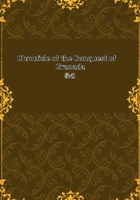
第160章
About two leagues from Granada, on an eminence commanding an extensive view of the Vega, stood the strong Moorish castle of Roma.
Hither the neighboring peasantry drove their flocks and herds and hurried with their most precious effects on the irruption of a Christian force, and any foraging or skirmishing party from Granada, on being intercepted in their return, threw themselves into Roma, manned its embattled towers, and set the enemy at defiance. The garrison were accustomed to have parties of Moors clattering up to their gates so hotly pursued that there was barely time to throw open the portal, receive them within, and shut out their pursuers; while the Christian cavaliers had many a time reined up their panting steeds at the very entrance of the barbican, and retired, cursing the strong walls of Roma that robbed them of their prey.
The late ravages of Ferdinand and the continual skirmishings in the Vega had roused the vigilance of the castle. One morning early, as the sentinels kept watch upon the battlements, they beheld a cloud of dust advancing rapidly from a distance: turbans and Moorish weapons soon caught their eyes, and as the whole approached they descried a drove of cattle urged on in great haste and convoyed by one hundred and fifty Moors, who led with them two Christian captives in chains.
When the cavalgada arrived near the castle, a Moorish cavalier of noble and commanding mien and splendid attire rode up to the foot of the tower and entreated admittance. He stated that they were returning with rich booty from a foray into the lands of the Christians, but that the enemy was on their traces, and they feared to be overtaken before they could reach Granada. The sentinels descended in all haste and flung open the gates. The long cavalgada defiled into the courts of the castle, which were soon filled with bleating and lowing flocks and herds, with neighing and stamping steeds, and with fierce-looking Moors from the mountains. The cavalier who had asked admission was the chief of the party; he was somewhat advanced in life, of a lofty and gallant bearing, and had with him a son, a young man of great spirit and fire. Close by them followed the two Christian captives, with looks cast down and disconsolate.
The soldiers of the garrison had roused themselves from their sleep, and were busily occupied attending to the cattle which crowded the courts, while the foraging party distributed themselves about the castle to seek refreshment or repose. Suddenly a shout arose that was echoed from courtyard and hall and battlement. The garrison, astonished and bewildered, would have rushed to their arms, but found themselves, almost before they could make resistance, completely in the power of an enemy.